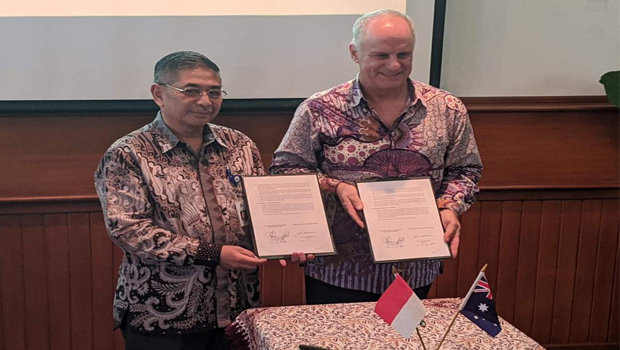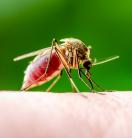Indonesia and Australia team up in zoonotic malaria research

The Eijkman Institute for Molecular Biology (EIMB) and the Australian Centre for International Agricultural Research (ACIAR) have today signed a Memorandum of Understanding (MoU) to forge a cooperation in research on zoonotic malaria (malaria spread between animals and people).
The MoU aims to strengthen the relationship between Indonesian and Australian researchers and support broader OneHealth related multidisciplinary collaborative research projects and activities.
The zoonotic malaria (ZOOMAL) project links Indonesian and Australian researchers seeking to evaluate transmission of malaria parasites (specifically Plasmodium knowlesi) from macaque monkeys to humans across Indonesia.
Little is known about the transmission of P. knowlesi in Indonesia, however in Malaysia changes in agricultural and forestry land use have been linked to increasing numbers of cases of zoonotic malaria, particularly affecting farmers and plantation workers.
The two-and-a-half-year multi-disciplinary study will conduct human surveillance using accurate molecular detection methods, geospatial risk mapping, social science and health economic modelling, macaque camera trapping, agricultural surveys, and mosquito vector evaluation in different habitats.
Investigation into zoonotic malaria transmission will be carried out in three Provinces in Indonesia. Eijkman Institute will lead the study in Malinau district (North Kalimantan) and Sabang district (Aceh). Other sites in North Sumatra Province including Batubara, Asahan, Labuan Batu Utara, Tapanuli Tengah districts will be coordinated through Universitas Sumatera Utara.
The MoU was signed by Director of EIMB, Prof Amin Soebandrio and ACIAR CEO Prof Andrew Campbell. The Australian Commission for International Agricultural Research witnessed the event.
Professor Amin Soebandrio said that the research will lead to better understanding of zoonotic malaria transmissions across Indonesia. The state-of-the-art molecular techniques will be applied by EIMB researchers to find better tools to inform understanding about the hot-spots of zoonotic malaria infection.
“This study is important for us to develop and validate the best methods to detect the zoonotic malaria parasite in humans, in order to better understand how and where the parasite may be transmitted.”
Prof Andrew Campbell from ACIAR said that multidisciplinary approaches to emerging zoonotic infections are increasingly important.
“This innovative joint research is timely. Coronavirus reminds us of the need to strengthen linkages between veterinary and human surveillance systems and facilitate sustainable agricultural development in the context of rapidly changing environments, complex flows of people, goods and animals, and consequent infection risks,” he said.
The project is jointly funded by ACIAR and the Department of Foreign Affairs and Trade (DFAT) as part of the OneHealth for Systems Strengthening Program. The first project implementation meeting for ZOOMAL will take place on 17-18 March 2020 in Jakarta. The meeting will include representatives from ACIAR, EIMB, Menzies School of Health Research , Universitas Sumatera Utara, James Cook University, The University of Western Australia, the University of Melbourne and CSIRO.




